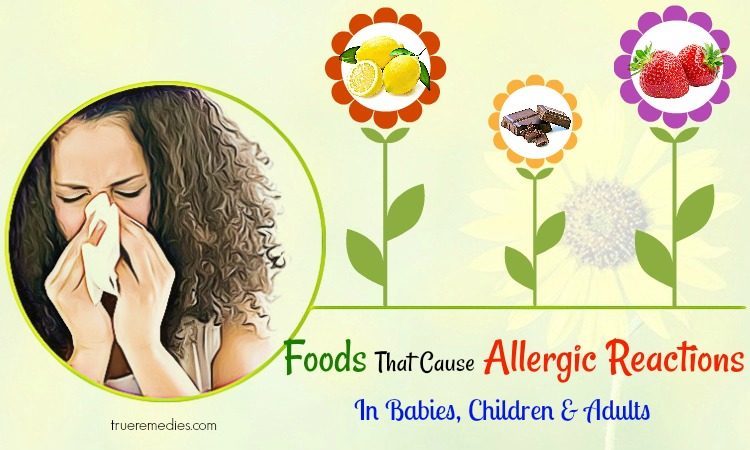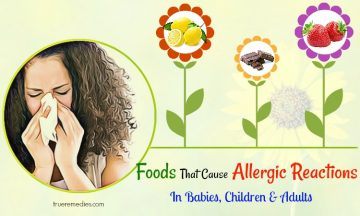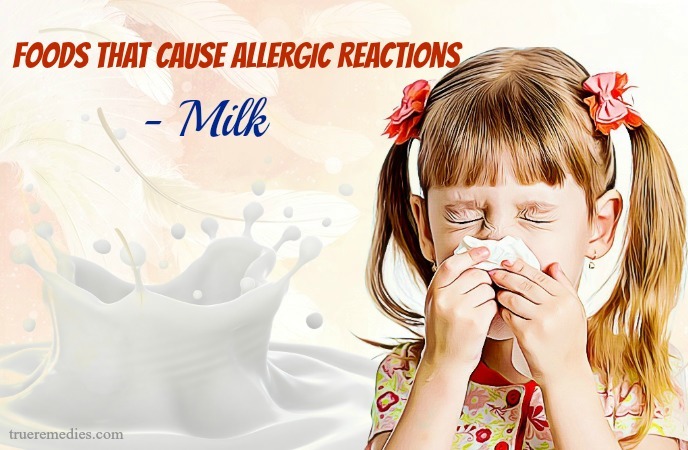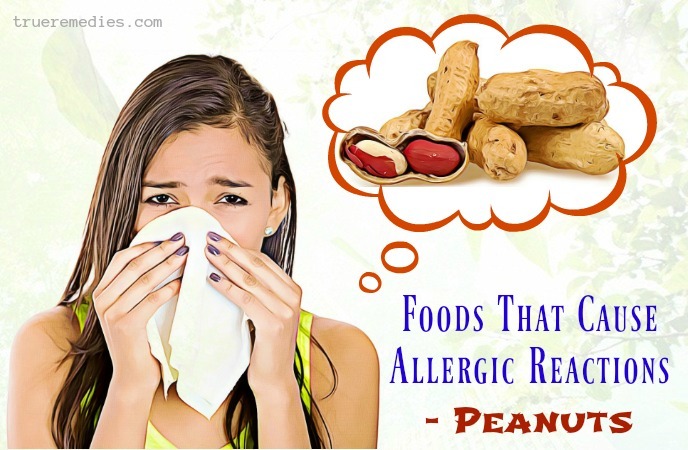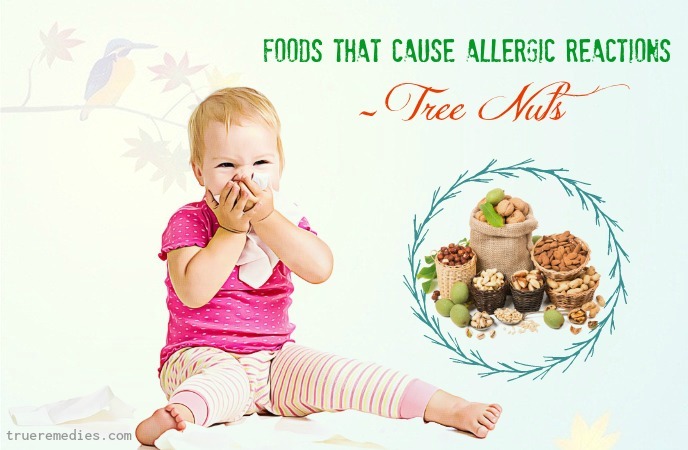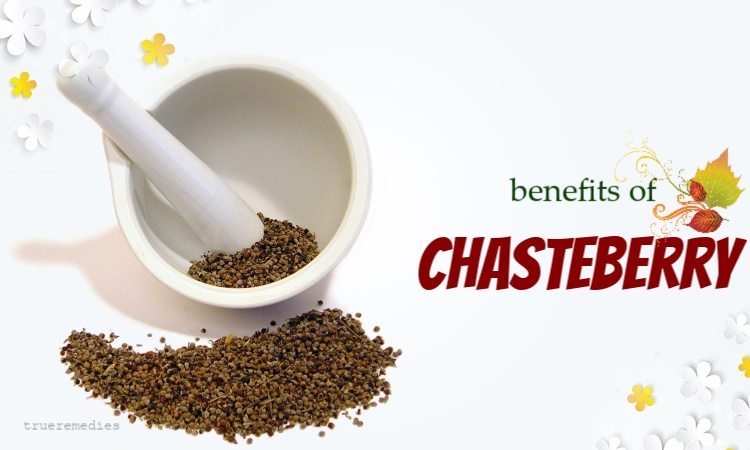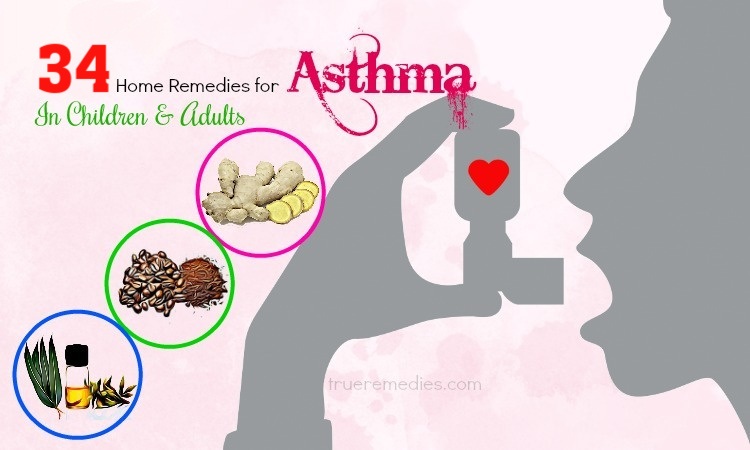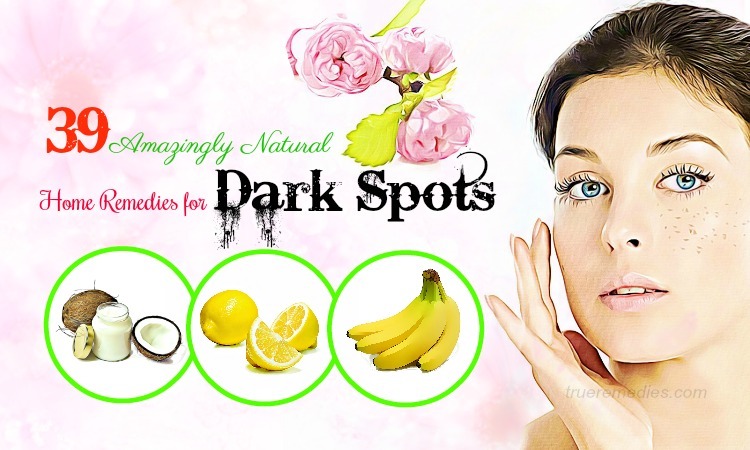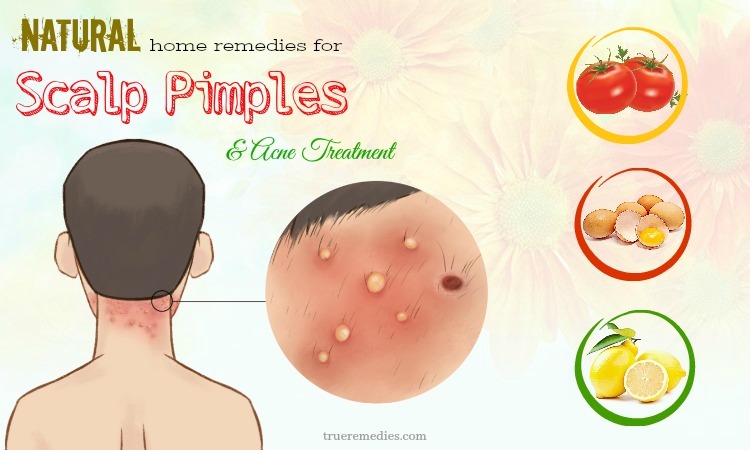Contents
Allergies are divided into different levels, ranging from mild to severe. Allergies occur when the body produces antibodies against non-dangerous substances (e.g. food, cat hair or dust). This over-reaction of the immune system can cause symptoms such as fatigue, irritation of the skin, stuffy nose, digestive disorders, or even life-threatening reactions. Whether it is mild or severe, you need to know how to handle the reaction to minimize pain and even save your life.
There are several ways to reduce allergies at home, but if these do not work, you should see a doctor. However, it is best to avoid the triggers of allergic reactions. This article will provide you with foods that are the causes of this condition. But first, let's find out some information about allergic reactions.
What Is An Allergic Reaction?
An allergic reaction is a disorder of the immune system. An allergic reaction occurs when the immune system tries to fight off harmless substances in the environment which are known as allergens. These reactions usually occur quickly and they can be predicted. The function of the immune system is to protect the body against various substances in the environment. In these substances, there are allergens.
In people with an allergy, there is an antibody called immunoglobulin E (IgE). When they come in contact with allergens (food, pollen, mold, or dust), their body produces IgE antibodies. Then, this particular IgE will attach to the surface of the mast cells (especially in the nose, eyes, lungs and gastrointestinal tract) and wait for their specific allergens.
Each type of IgE has specific “rada” for each allergen. These allergens are specifically captured by IgE and incorporated into the antigen-antibody complex. This combination stimulates mast cells to release histamine and other chemical intermediates. These substances cause allergic reactions such as swelling of the tissues, sneezing, wheezing, coughing and other reactions.
Allergic reactions can cause a number of medical disorders, such as sinusitis, eczema, and asthma. They also worsen the symptoms of these conditions. To diagnose an allergic reaction, skin tests should be performed to determine the level of allergic response. Experts can also analyze the blood to check the presence and concentration of IgE antibodies. Treatments for allergy include avoiding exposure to allergens, and using antihistamines, steroids (anti-inflammatory drugs) or other drugs.
TrueRemedies Partner Solutions

Need a Help from the Leading Expert Online, Available 24/7?
They’re all here and ready to answer your questions online or by phone. Keep asking questions until you get the answer you need.
What Are Common Causes Of An Allergic Reaction?
Here are common causes of this condition:
- Genetic Factors
Allergic reactions are very common. Genes and environment play an important role. If both of your parents are allergic to a particular allergy, you are at risk for this condition.
- Weakened Immune System
The immune system often protects the body against harmful substances, such as bacteria and viruses. The immune system also reacts with an allergen which is usually harmless. This allergen does not cause problems in most people. For people with allergies, the immune response becomes overactive. When it recognizes an allergen, the immune system starts a stronger reaction than normal.
Chemicals like histamine are created. These chemicals cause allergic symptoms. Allergens include drugs, dust, food, insect venom, mold, pet hair, and pollen. Some people have allergic reactions when exposed to hot or cold temperatures, sunlight, or other environmental factors. Sometimes, friction (rubbing or caressing the skin) will also cause allergic symptoms.
- Cosmetic
Some poor quality cosmetics or some corticosteroid cosmetics may cause allergic reactions. Then, the skin will appear reddish plaque which causes itching. This symptom usually appears after a few hours after you use cosmetics. Generally, common cosmetic allergens are perfumes, lotions, makeup powder, and shower gel.
- Pollution Of The Environment
The environment is considered to have a great influence on the skin. Environmental pollution is one of the causes that weaken your immune system and cause you to have frequent contact with allergens. Not only that, these agents also cause you to have other skin diseases, greatly affecting the health as well as the aesthetics of the skin.
- Liver Function Is Impaired
We all know that the liver has the function of releasing toxins from the body. The liver dissolves the toxic substances in the body into a simple form so they can easily be excreted through the sweat glands, urine and excrement. If liver function is impaired, the immune system is severely damaged. This makes you susceptible to allergic reactions.
- Fungi And Bacteria
You can get fungal or bacterial infections when you are in a polluted environment or when you are infected by someone else. Allergy to these fungi and bacteria makes your skin rash. Then, you can completely overcome this situation by using drugs that help prevent bacteria and soothe the skin itching.
What Are Common Symptoms Of An Allergic Reaction?
Here are common symptoms of this condition:
- An allergy which comes into contact with the nose often causes nasal congestion, itching of the nose and throat, phlegm, coughing nd wheezing.
- An allergy which comes into contact with the eyes can cause itching, watery eyes, redness, and swollen eyes.
- Foods that cause you to have allergies can cause nausea, vomiting, abdominal pain, diarrhea, or anaphylaxis. Anaphylaxis can cause some symptoms such as urticaria, itching, redness, swelling of the tongue, hardening of the throat, difficulty in breathing, vomiting, diarrhea or fainting.
- If an allergen is in contact with the skin, it can cause skin rash, urticaria, itching, and blisters.
- Drug allergies often involve the whole body and can lead to a variety of symptoms.
You may experience other symptoms not mentioned. If you have any questions about the signs of the disease, please consult your doctor.
Who Is At High Risk Of This Condition?
There are several risk factors that make you susceptible to allergic reactions:
- Some members of your family have allergies or asthma.
- Children are more susceptible to allergies than adults. As they grow older, the symptoms of this condition can be reduced.
- You have been suffering from diseases such as asthma or allergies. Having a history of these diseases can increase the risk of allergies.
You can control this problem by minimizing risk factors. Please see your doctor for more information.
When To See A Doctor?
But if after a period of time applying home remedies without seeing results, you should see your doctor for a direct test. Besides, if you have any of these signs or symptoms or have any questions, please consult your doctor. Each person's condition is different, so please consult your doctor to select the most suitable option.
The above information is about allergic reactions. You should know this information as it helps you to accurately determine your condition as well as identify appropriate measures to improve it.As you know, some foods can cause allergic reactions. Here is a list of these foods. You need to avoid consuming them.Please take a look at TrueRemedies.com!
List Of 11 Common Foods That Cause Allergic Reactions In Babies, Children And Adults
1. Foods That Cause Allergic Reactions – Milk
Milk is the first common food in the list of foods that cause allergic reactions in babies and children. It affects from 2% to 3% of babies and toddlers [1]. Milk is good for the health and development of children. It is the best source of calcium and that's exactly what you need. In addition, milk helps prevent tooth decay. Milk nutrients also help keep bones strong and healthy, helping your children grow taller.
Besides, this is also a great food to improve muscle growth thanks to the rich content of protein. Many athletes drink milk after exercise because it provides the essential nutrients needed to restore health.
Moreover, because milk contains many vitamins and minerals, it can help reduce stress. Milk actually brings a lot of health benefits. Unfortunately, this kind of drink can cause allergies in children.
Milk allergies are common in children because their bodies do not produce lactase – an enzyme needed to digest sugar in milk. Immune system as well as digestive system of children is not perfect so they do not increase lactase secretion. Children, therefore, need to limit consumption of milk, butter, cheese and ice cream
Cow milk is one of the most allergenic milk for children. The statistics show that about 2.1% of children allergic to cow's milk and 12.6% of children have symptoms of allergic symptoms. However, the allergy to milk in children usually lasts only 1-3 years so you do not need to worry too much about this [2].
2. Foods That Cause Allergic Reactions – Chocolate
Chocolate is the next food that should be mentioned in this list of foods that cause allergic reactions in humans. Chocolate has many benefits for the heart and brain. Many studies have found that chocolate is good for the heart, blood circulation and brain. Besides, it also helps prevent serious health problems like diabetes and Alzheimer's.
Recent research shows that dark chocolate helps restore blood circulation in the arteries, while preventing white blood cells from sticking to blood vessels. Researchers in Finland conducted a study on a group of people and found that chocolate consumption reduced the risk of stroke by 17%.Chocolate consumption lowers bad cholesterol levels (LDL) and increases good cholesterol levels (HDL), preventing the risk of cardiovascular disease. A study in the British Medical Journal (BMJ) found that chocolate consumption could reduce the risk of developing heart disease by 35 percent.
About 70-85% of the composition of a dark chocolate is cacao. This makes it dangerous for some people. Chocolate carries a high risk of allergy. Because there are too many cocoa in chocolate, many people cannot absorb it. This causes allergic reactions. Although cocoa is good for health, you may notice your body has a negative reaction to it. Therefore, people with chocolate allergies also need to avoid products that contain cocoa like cocoa powder, cocoa milk and cocoa butter.
3. Foods That Cause Allergic Reactions – Soybean
Among the foods that cause allergic reactions, soybean is the most noticeable food. Soybean is one of the foods that are gluten free and low in calories, so it is very beneficial for people who want to lose weight or maintain their weight.
In addition, soybean does not contain cholesterol and it is an excellent source of protein, iron, and calcium which are very good for health. If you are following a vegetarian diet, this will be a very important source of protein for you. The protein source in soybean will provide your body with essential amino acids like meat and milk.
Soybeans also contain healthy polyunsaturated fats, especially omega-3 alpha linolenic acids. According to the American National Nutrient Database, a cup of frozen soybeans (155 grams) contains 189 calories, 1 gram of saturated fat, 16 grams of total carbohydrates, 8 grams of fiber, 3 grams of sugar and 17 grams of protein. This is really a very nutritious food [3].
Unfortunately, soybeans can cause allergies to the human body, especially in children. Signs and symptoms of soy allergies usually develop within minutes to hours after eating foods that contain allergens. If you have an allergy to this vegetable, you will experience symptoms such as itching in your mouth, rash, swelling, wheezing, runny nose or shortness of breath. In addition, the body may develop abdominal pain, diarrhea and nausea.
In rare cases, soy allergy can cause a life-threatening allergic (hypersensitive) reaction. If you or your child reacts to soy, tell your doctor. Tests can help identify soy allergies. If this condition occurs in children, it may disappear when the child is 3 years old.
4. Foods That Cause Allergic Reactions – Lemon
Lemon is one of the foods that cause allergic reactions in children and adults that few people know. Lemon juice is probably the favorite drink of many people. While billions of dollars are spent on research and development of medicines, scientists have shown that lemon juice can reduce and even cure many diseases. It is known that lemons have therapeutic uses such as detoxifying the body by stimulating the functioning of the liver and kidneys, boosting the immune system and reducing the effects of free radicals.
Recently, the Australian Agency for Science and Industry (CSIRO) said that a lemon also has the effect of preventing cancer. A lemon contains up to 22 anti-cancer substances including limonene, citrus pectin, flavonol glycosides, and vitamin C. Therefore, people are advised to consume at least 150 grams of lemons per week.
However, this fruit is also a perpetrator of allergic conditions. If your body is high in acid, you need to be very careful when consuming lemonade or lemon peel. When you consume lemon, the acidity in your body will increase very high, causing a rash. You may also experience allergic reactions when applying lemon juice to skin. Wash your affected skin area and do not apply any medication to this area. If you feel itching, you can take antihistamines to help limit this condition. Then, if your skin is back to normal, you just need to avoid contact with lemon to prevent allergies. But if the symptoms of this condition do not go away, or even worse, you should see a doctor.
Learn more: 15 Common Foods That Cause Stomach Bloating And Gas
5. Foods That Cause Allergic Reactions – Peanuts
It is no accident that peanut is one of the favorite snacks of many people. About 30 grams of peanuts can provide 35% of the manganese needed for the body. Manganese is a mineral that plays an important role in metabolizing fats and carbohydrates, absorbing calcium and regulating blood sugar levels.
Peanuts are rich in folic acid, which is essential for the fertility of women. Studies have shown that women need to be given 400 micrograms of folic acid a day before and during early pregnancy. Surprisingly, peanuts can help prevent gallstones. Many studies have shown that eating one ounce of peanut or peanut butter a week may reduce the risk of developing gallstones by 25%. Frequent consumption of peanuts brings many benefits to the body.
However, many people, especially children, are allergic to peanuts. Peanut is one of the most allergenic foods, and it is often found in foods that you do not expect, such as chili sauce. Do you know that this kind of soy sauce can be thickened with peanuts? Peanut can bring about reactions in the skin, digestive system and respiratory tract.
Peanut allergies impact about 4 to 8% of children and 1 to 2% of adults [4] [5]
Proteins in peanuts are structurally similar to proteins in nuts. For this reason, people allergic to peanut may also be allergic to nuts such as almonds, Brazil nuts, walnuts, hazelnuts, macadamia nuts, pecans and cashew nuts. A special note to you, if your body is allergic to peanuts, it is necessary for you to stop the love with the food containing chocolate.
6. Foods That Cause Allergic Reactions – Eggs
The next food in this list of foods that cause allergic reactions in children and adults is egg. Egg is a very nutritious food. Yolk is the most important component of the egg, which concentrates most nutrients of an egg. Egg yolk contains 13.6% protein, 29.8% of fat and 1.6% of mineral. Protein in egg yolks has the best amino acid composition. Egg is a good source of essential amino acids that play important roles in the body, especially essential for the development of both weight and height. Also, there are a large amount of vitamins and minerals, such as vitamin A, vitamin B1, vitamin D, iron, zinc, copper, manganese, and iodine in eggs. Along with sunlight, eggs will help you to absorb more vitamin D.
In addition to these great benefits, eggs can also cause negative reactions in some people, especially in young children. However, 68% of children who get allergic to eggs are going to outgrow allergies by the time they are 16 [6]. Many children get rash and itching after eating eggs. Other symptoms include digestive distress, like a stomach ache, respiratory issues, and anaphylaxis. Interestingly, it is possible for children to be allergic to the egg yolks, but not egg whites, and vice versa. The reason is that the proteins in egg yolks and egg whites different slightly. Nonetheless, most of proteins triggering an allergy are found in the egg whites. That is why allergic reactions to egg whites are more common [7].
According to statistics, the proportion of children allergic to eggs, especially to the white egg, is 1.5%. This is the mechanism of the allergic reaction: the immune system does not accept the protein component of the egg and considers it as a threat. At this time, antibodies signal to release histamine and many other components of the immune system and cause various allergic manifestations. Similar to other allergies, the treatment for egg allergies is an egg-free diet [8].
However, it is not necessary to avoid all foods related to eggs, because heating eggs could change the shape of proteins that cause allergies. This stops the human body from recognizing them as a harmful object, meaning the chances of causing reactions will reduce [9] [10] [11].
7. Foods That Cause Allergic Reactions – Seafood
Seafood is the next well-known one in this list of foods that causes allergic reactions. Seafood is an important part of a healthy diet and contains high levels of protein, essential nutrients, and Omega-3 fatty acids but low saturated fat content. Therefore, a balanced diet that includes a variety of seafood can ensure a healthy heart. Seafood is a good source of protein for the body. Protein in seafood which is easy to be eaten and digested can help slow down the aging process.
Seafood containing omega-3 fatty acids, especially DHA, thereby it help reduce or prevent depression. Omega-3 fatty acids found in seafood help prevent heart disease, reduce triglyceride levels in the blood, and decrease the level of bad cholesterol in the body. Seafood is also rich in iron and zinc minerals, which help your body produce more blood to prevent anemia.
Although seafood is delicious and good for health, you should be careful when eating it. Seafood contains a lot of protein, including “strange” protein. This ingredient often stimulates defense in the body, leading to allergic reactions. When you are allergic to seafood, you may experience symptoms such as abdominal pain, vomiting, and urticaria.
The best way to avoid this situation is to absolutely not eat seafood because experts estimate that the seafood allergy does not go away and disappear, no matter how you change the way it is processed. Many people think that when processed at high temperatures, the allergenic potential of seafood will be lost. However, this is a false thought. Be careful because seafood can cause life-threatening allergic reactions.
Also read: 10 Common Foods That Cause Headaches And Migraines
8. Foods That Cause Allergic Reactions – Wheat
Wheat is the next one in this list of foods that causes allergic reactions in children and adults. Wheat is one of the most widely consumed cereals in the world. Whole wheat flour and white wheat are important ingredients in some baked foods such as bread. Carbohydrate is a major component of wheat. This makes wheat a very good food for patients with diabetes. Like cereal grains, wheat contains a lot of carb. In addition, whole wheat flour also contains a lot of fiber, vitamins and minerals good for the body.
A wheat allergy is the allergic response to certain proteins in wheat. This condition tends to impact children the most. Like other types of allergies, a wheat allergy could lead to digestive distress, hives, vomiting, swelling, rashes and anaphylaxis (rare).
People with wheat allergies just need to avoid this food and could still tolerate the gluten from grains which do not have wheat. The only treatment for a wheat allergy is to avoid this fruit and products containing it. It means avoiding foods, cosmetic and beauty products that have wheat.
About 0.4% of children are allergic to wheat. About 80% of them will get out of the situation when they are 6 years old. Wheat allergy is a special reaction of the immune system to certain proteins in wheat. If you are allergic to wheat, you will suffer from discomfort in the skin, throat and intestines. Anaphylaxis is very rare.
9. Foods That Cause Allergic Reactions – Tree Nuts
The allergy caused by tree nuts is rather common, which impacts about 1% of the US [12] [13] [14].
Some instances of tree nuts are Brazil nuts, cashews, almonds, pistachios, walnuts, pine nuts, and macadamia nuts. People having this kind of allergy will also have allergic reactions to foods products made with these tree nuts, like nut oils or butters.
Thus, it is better to avoid tree nuts of all kinds, even when you are just allergic to a few types [15]. It is because allergies to just a single type of tree nut may increase your risk of getting an allergy to other kinds of tree nuts. Besides, dissimilar to other allergies, being allergic to tree nuts is often a lifelong issue. Indeed, tree nuts are considered one of the most common foods that cause allergic reactions. This allergy tends to be inherited. Young siblings of people with allergies seem to show the same signs, despite the severity might be lower. To make sure about this allergy, it is necessary to get tested.
10. Foods That Cause Allergic Reactions – Strawberries
Strawberries are among foods that cause allergic reactions in children. This childhood allergy is considered the most surprising and also the hardest. Children often adore strawberries. They are naturally sweet, juicy, and summery.
Similar to the allergies mentioned earlier, the proteins in strawberries are the culprit of this problem. It is just available in the strawberries, not all types of strawberries. Other berries as well as similar fruits will usually be perfectly safe for babies and children. Their immune system reacts to specific proteins in this fruit.
Thus, prior to allowing your child to consume strawberries, you should introduce them carefully. Let them eat steadily a small amount of strawberries and watch for any reactions.
Instead of strawberries, you had better choose blueberries, raspberries and cranberries for your children. They also give similar summery feeling and offers sweet and delicious taste.
11. Foods That Cause Allergic Reactions – Kiwis
Speaking of foods that cause allergic reactions, kiwis are among allergy-causing fruits. This exotic fruit is very common in children who also have other types of allergies. Nonetheless, it could be an allergy within the fruit itself.
There are proteins in kiwis that react with the immune system of the child. The same also goes for the acids in kiwis. Some children may break out rashes around lips when eating this fruit, whilst others may have severe reactions. This sensitivity could become worse over time.
However, in fact, allergy to kiwis is not likely to be outgrown in children. Fortunately, there are a lot of other fruits that could replace kiwis.
Now that you have known 11 common foods that cause allergic reactions in babies, children and adults. When consuming these foods, you need to carefully monitor the reactions of the body with them to have timely treatment methods. If you have any contributing ideas about our article of “11 Foods That Cause Allergic Reactions In Babies, Children and Adults” introduced in Super Foods Category, do not hesitate to drop your words below this post. We will answer as soon as we could.

